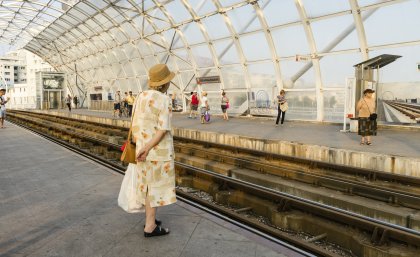
Streetscapes, cafes, buses and planes weren't necessarily designed to deal with the ageing population explosion, however older people can advocate change to their environment by voicing concerns.
A study led by Dr Anthony Tuckett from The University of Queensland’s School of Nursing, Midwifery and Social Work said the built environment had a powerful impact on the health of older people and on their ability to age well.
“We live in a moment in history where there are greater numbers of older people than younger people and, consequently, this risks an increased number of wheelie-walkers, motorised scooters and slower-paced older people,” Dr Tuckett said.
“With this demographic shift, policy makers haven’t been able to adapt quickly enough to cater for the changes required among our built environments.
“A promising strategy to deal with this issue is encouraging citizen science, where older adults take an active role in documenting features of their environment that help or hinder healthy living and then voice them to policy makers to promote change.”
The literature review examines how the ‘Our Voice’ framework developed by Abby King and colleagues at Stanford University is a proven successful strategy adopted by communities worldwide that improves both individual and community health.
The study recommends ways gerontological nurses, clinicians and scholars could encourage citizen science and support policies and programs that promote healthy environments for older people.
“Research on the built environment, physical activity and the associated health benefits for older people is well documented, however isn’t broadly used by gerontological nurses,” Dr Tuckett said.
“We hope the review will motivate and encourage gerontological nurses, whether they are community nurses or residential aged care nurses, to take a fresh look at the communities in which they work, and broaden their approach to promoting health and providing care for older people.
“A two-pronged approach is required where gerontological nurses need to be educated about the benefits of citizen science and how they can encourage it among the groups they work in; and older people themselves need to be educated, so they are armed with the necessary information and tools to take action.
“For example we need to design streetscapes that are safe and wide enough for older people to walk in.
“These are ‘age-friendly environments’ which will ultimately soften the impact of disability onset and poor health associated with ageing.
“It is vitally as important public policies are reviewed so they support healthy ageing and take into account the perspectives and experiences of the older people themselves.
“By adopting the ‘Our Voice’ approach it will simply be better in the long run for older people and society.”
The study was published online in the International Journal of Older People Nursing.
Watch a video on Our Voice: Citizen Science for Health Equity.
Media: Dr Anthony Tuckett, a.tuckett@uq.edu.au; UQ Communications, Kirsten O’Leary, kirsten.oleary@uq.edu.au, +61 7 3365 7436.
.jpg)

